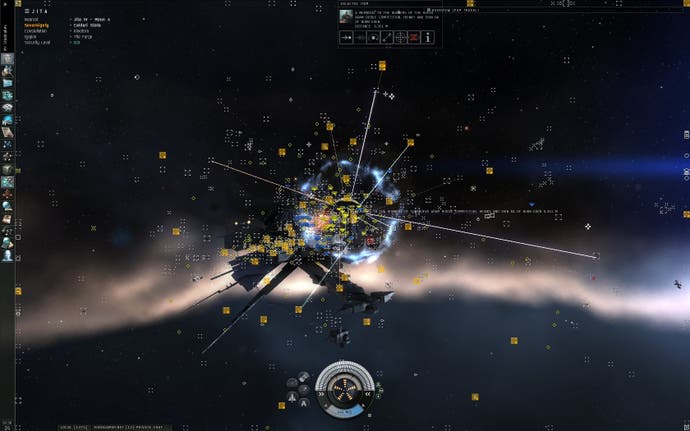Eve Online in Crisis
CCP under pressure as players revolt over micro-transactions.
It should have been a triumphant week for CCP.
The Incarna expansion to Eve Online - AKA Ambulation, AKA Walking in Stations - was first announced over five years ago. Launched last Tuesday, it brought human avatars to a game previously focused solely on spaceships.
But instead of becoming a jubilant landmark, the past week has been dominated by an escalating crisis fuelled by leaked internal documents, a proposed attempt to further monetise a game described internally as a "golden goose", and a developer attitude that has caused consternation and anger within its community.
We've been here before, of course; Eve Online is no stranger to drama, and it's a salacious thrill that contributes to the game's appeal. In 2007, a developer abused their position at CCP to provide their Corporation with an in-game advantage. More recently, players were left outraged when the elected player body, the Council of Stellar Management (or CSM), revealed that CCP intended to focus on other projects for the coming 18 months rather than addressing core concerns with Eve.
So where did it all start?
While the developer courted a quieter controversy earlier in the month with an announcement that a $99 licensing fee would be required for services using the public API, it wasn't until a document was leaked online on Wednesday, outlining and debating the developer's plans to further monetise its flagship title, that the player revolt began in earnest.
Players already shocked by the $70 cost of an avatar accessory were left reeling by the proposals to extend micro-transactions beyond vanity items - to ships and ammunition, for example - as well as the apparent intent to squeeze Eve players to fund CCP's other projects. (Projects such as the Eve-linked PS3 shooter Dust 514 which, incidentally, will be supported by micro-transactions.)
"As a subscription-based golden goose, Eve needs to incorporate the virtual goods sales model to allow for further revenue - revenue to fund our other titles, revenue for its developer: you," read one passage. An explicit acknowledgement that public discussion was impossible due to a fear of being burned at the stake added further fuel to the fire. But CCP did not respond to the outcry.
One CCP employee was spared the wrath of the players as the silence continued. John Turbefield - described as a "master of spreadsheets" from the firm's Research and Statistics department - had argued the opposing view of the debate in the now infamous newsletter. He cautioned against decreased satisfaction through the "double billing" of customers. While players fumed, Turbefield was lionised.
An appeal for calm and dialogue reached players late on Thursday. But on Friday evening, with the issue remaining a one-way conversation, players took to the 'streets' of Eve to protest.
Direct action
Jita is a cesspit of all that's right and wrong about Eve Online. Scams, along with suicide attacks on freighters stuffed with precious goods, define a zone which acts as the prominent trade hub of the game. On Friday, thousands of players mobilised, targeting and unleashing fire-power on an indestructible monument in the system - a silent protest under disco lights. Footage of the event has been uploaded to YouTube, although be advised that the language of the soundtrack gets a little fruity towards the end.
It would be crass to suggest - as some did - that this was comparable to recent real-world protests, where repercussions can be fatal. But it was direct action, a scene of rioting that was legitimately enacted through the mechanics of the game - and it was thrilling to observe.

As Jita's capacity was reached, groups co-ordinated to flood the other trade hubs with traffic in an attempt to bring EVE's economy to a grinding halt. Server nodes were locked down, and while arriving players were refused entry, the end result was the same. For a moment on Friday night, the players gridlocked the economy.
Eve is a player-built world: economies, infrastructures and power blocs that have been built piece by piece over a number of years. A complex web of player interactions, from the slightest trade manipulation to the collapse of an Alliance, underpins the core principles of the game.
It's a precious creation, and emotions run higher than in any other game. The stories greedily consumed by players and non-players alike are all player creations. It's not possible, many have argued, to introduce a cash micro-transaction system into a game that was built from the ground up to put its destiny in the hands of the players rather than the developers.
Rightly or wrongly, there is a sentiment within the community that the developer would be foolish to ignore - that CCP is merely the caretaker of a hard-knock school that the players built for themselves. The subscriptions may belong to CCP, but the world belongs to its community.
















